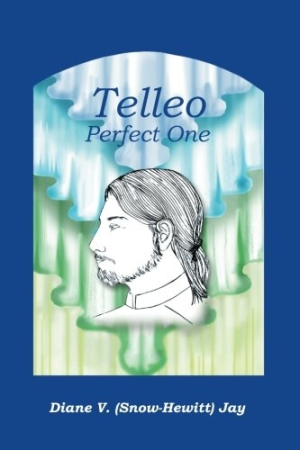
Telleo
Perfect One
Intriguing Christian fantasy tale asks why God allows his followers to suffer.
In this sweeping fantasy, Diane V. Snow-Hewitt Jay uses Bible scholarship and a vivid imagination to create an extended parable about the virtue of turning the other cheek. Familiar biblical stories are transformed into epic struggles between warring races in Telleo: Perfect One, Jay’s intriguing debut novel.
An amateur genealogist who enjoys researching her own family history, Jay fittingly begins her story with the unique family trees of two opposing species. First are the Yemimah, a peaceful, God-worshipping people with a shape-shifting talent and gold running through their veins. Also known as the Dove People, the Yemimah never fight and have created a society that assumes innocence. Unfortunately for them, a warrior race—the unfaithful Edomah—also exists, and the Edomah covet the valuable gold-infused blood of their neighbors.
Jay tells the story of this interspecies struggle largely through the eyes of the visionary Telleo, a devout Yemi man with a direct line to God. Telleo’s almost psychedelic experiences—walking through rainbow mists, speaking to an invisible presence, seeing a crystal portal—endow him with the word of God, known here as El Silverado, which Telleo distributes throughout the lands. El Silverado commands that the Yemimah remain nonviolent in the face of the attacking Edomah.
The story asks a compelling question: Why would God create suffering and ask his devoted followers to suffer the most? Jay is at her strongest when she concentrates on how Yemi villagers like Telleo and his wife Zoe deal with this conundrum, such as when the characters share their very human worries about their missing son, Jonas. Unfortunately, these exchanges are too often interrupted by effusive prayers and spectacular visions. The voice of a preacher in the pulpit suffuses much of the story, setting a reverent tone but failing to consistently engage readers in the characters’ plight.
Jay adds texture to her narrative with a series of illustrations, but like the plain portrait of Telleo on the book’s cover, these simple line drawings convey little about the characters’ personalities or the unfolding story. Jay also makes liberal use of italics, boldfacing, underlining, and capitalization to capture the reader’s attention, but the frequency of these devices diminishes their impact.
The worlds of the Yemimah and the Edomah are fully realized and attest to Jay’s rich imagination. She includes helpful indexes, including a glossary of names and a complex time line based on her unique calendar system. Dedicated readers will appreciate the details, but some will simply become overwhelmed by the wealth of ideas Jay offers.
A thoughtful trimming of this six-hundred-page tale would bring Telleo’s story into better focus and allow readers to enter Jay’s imagined world more fully. Fantasy fans and Christian readers, however, may find reasons to hang tight as the Yemimah and Edomah people work out their differences.
Reviewed by
Sheila M. Trask
Disclosure: This article is not an endorsement, but a review. The publisher of this book provided free copies of the book and paid a small fee to have their book reviewed by a professional reviewer. Foreword Reviews and Clarion Reviews make no guarantee that the publisher will receive a positive review. Foreword Magazine, Inc. is disclosing this in accordance with the Federal Trade Commission’s 16 CFR, Part 255.
